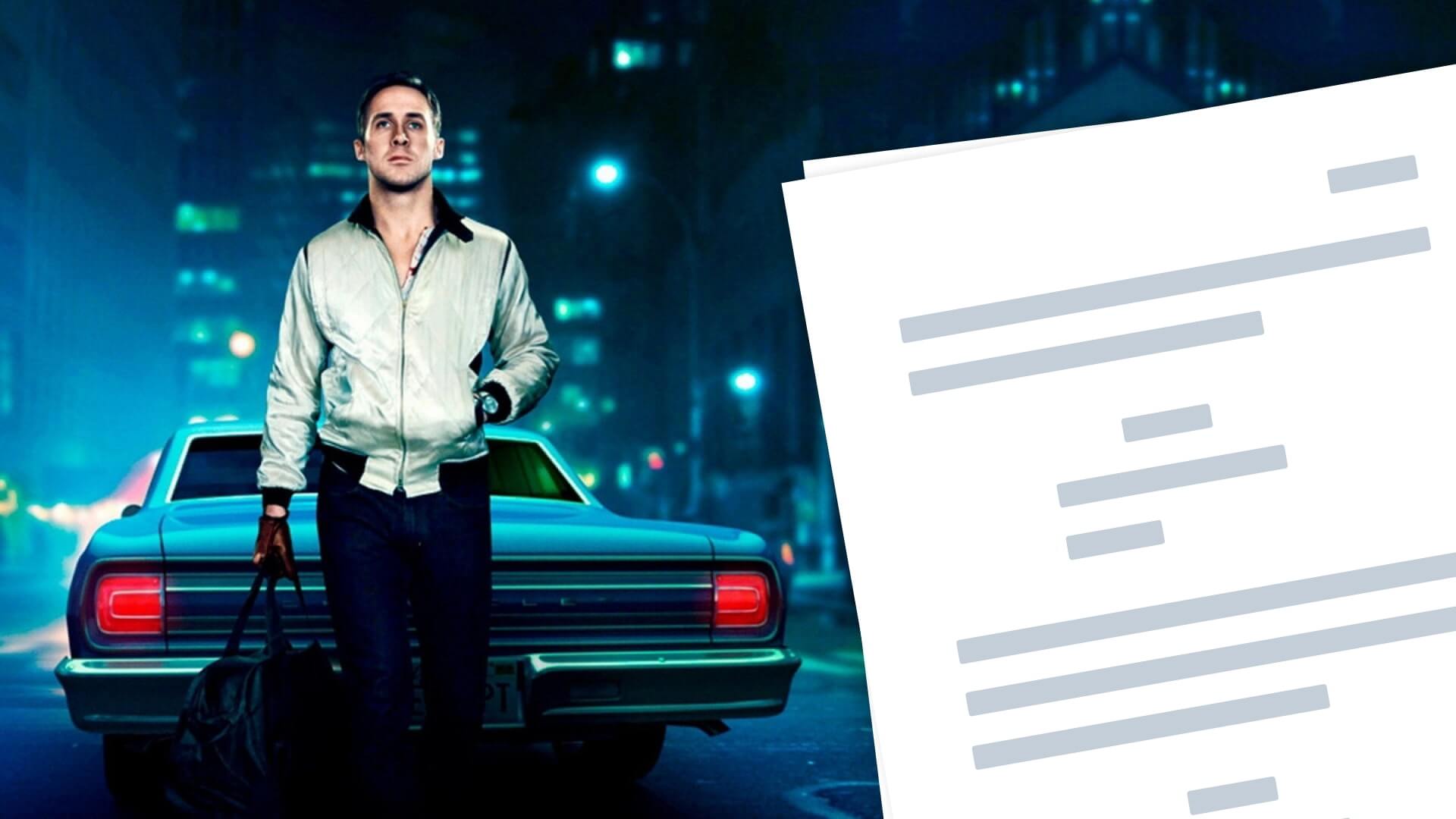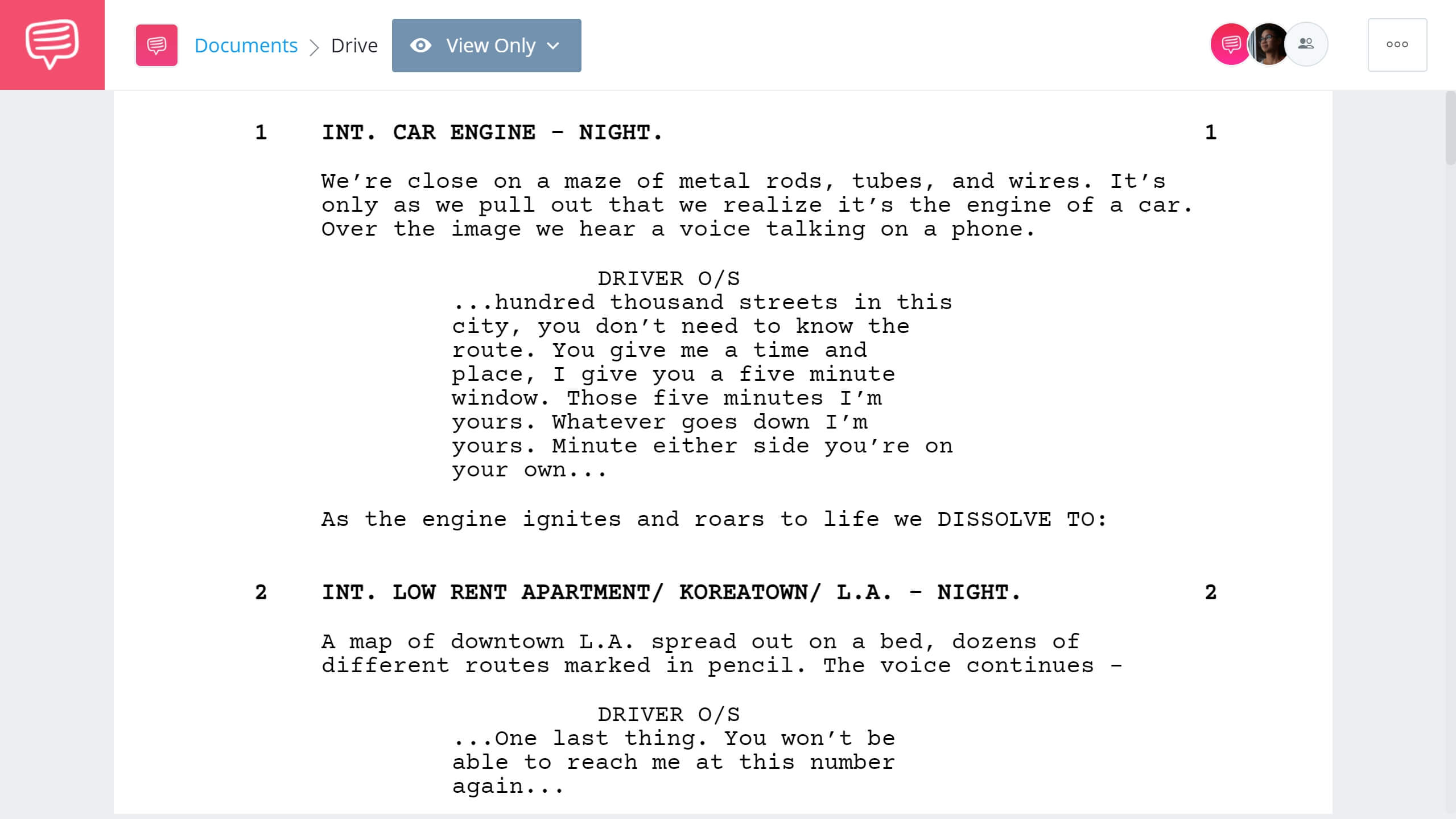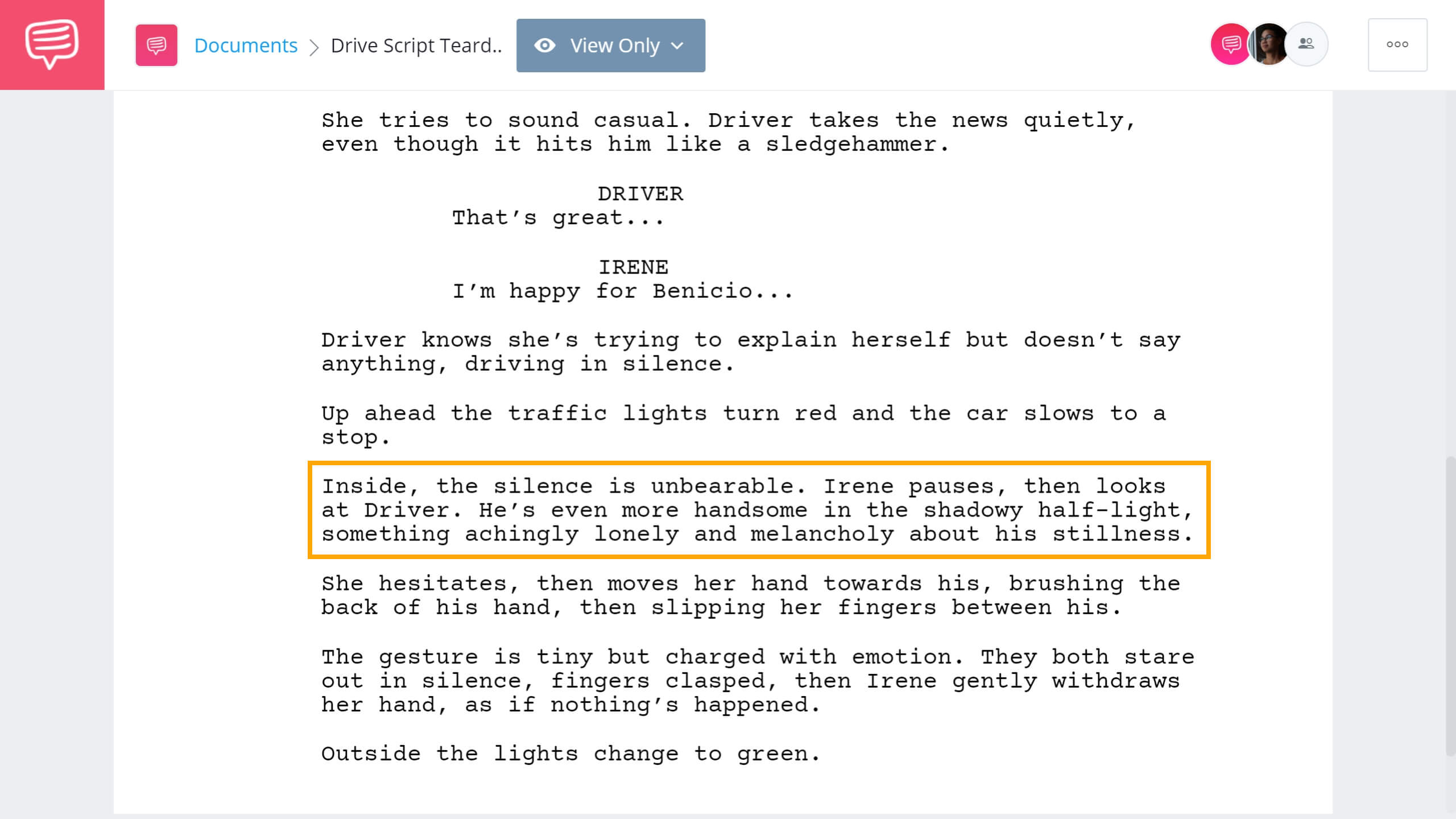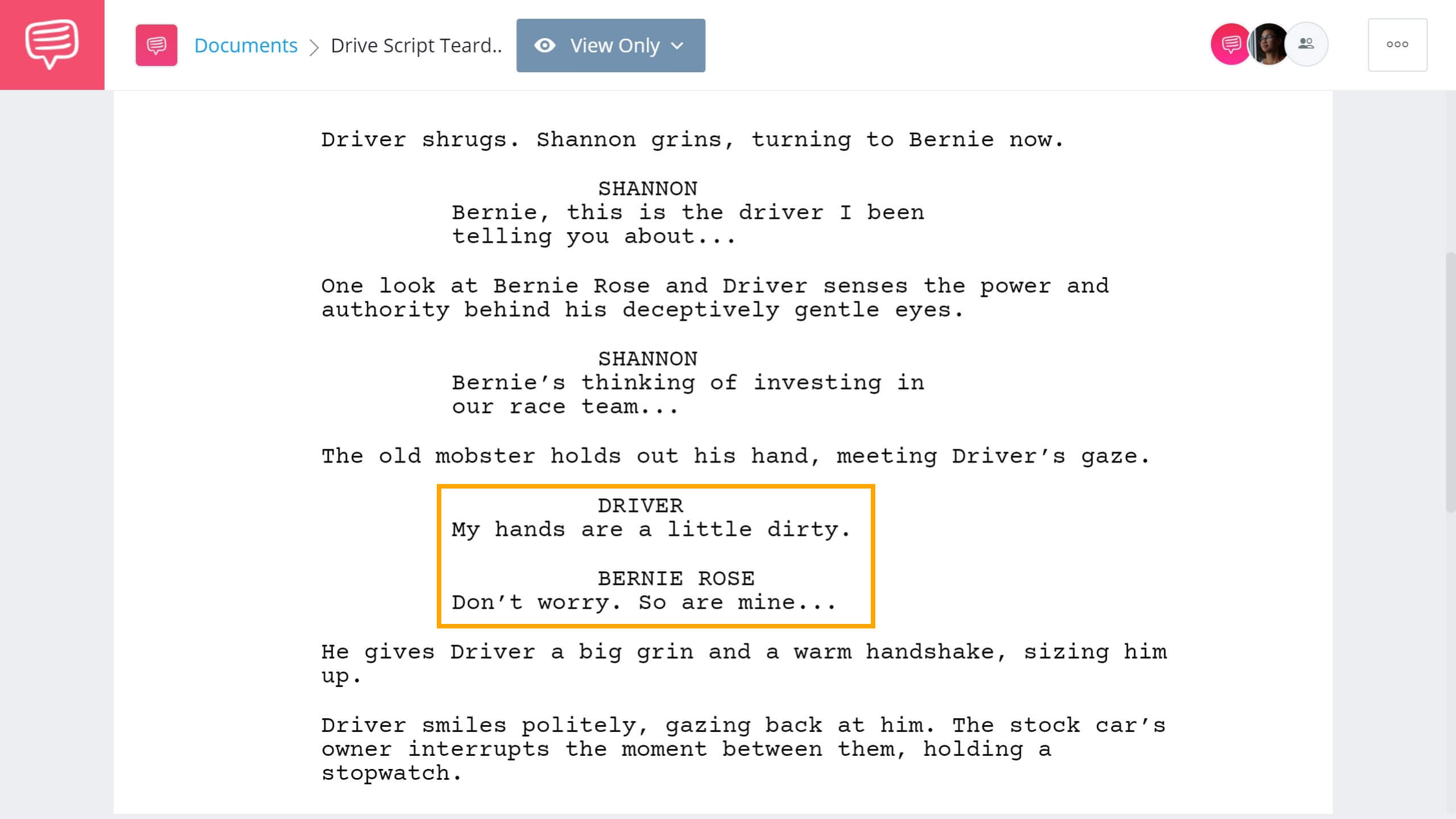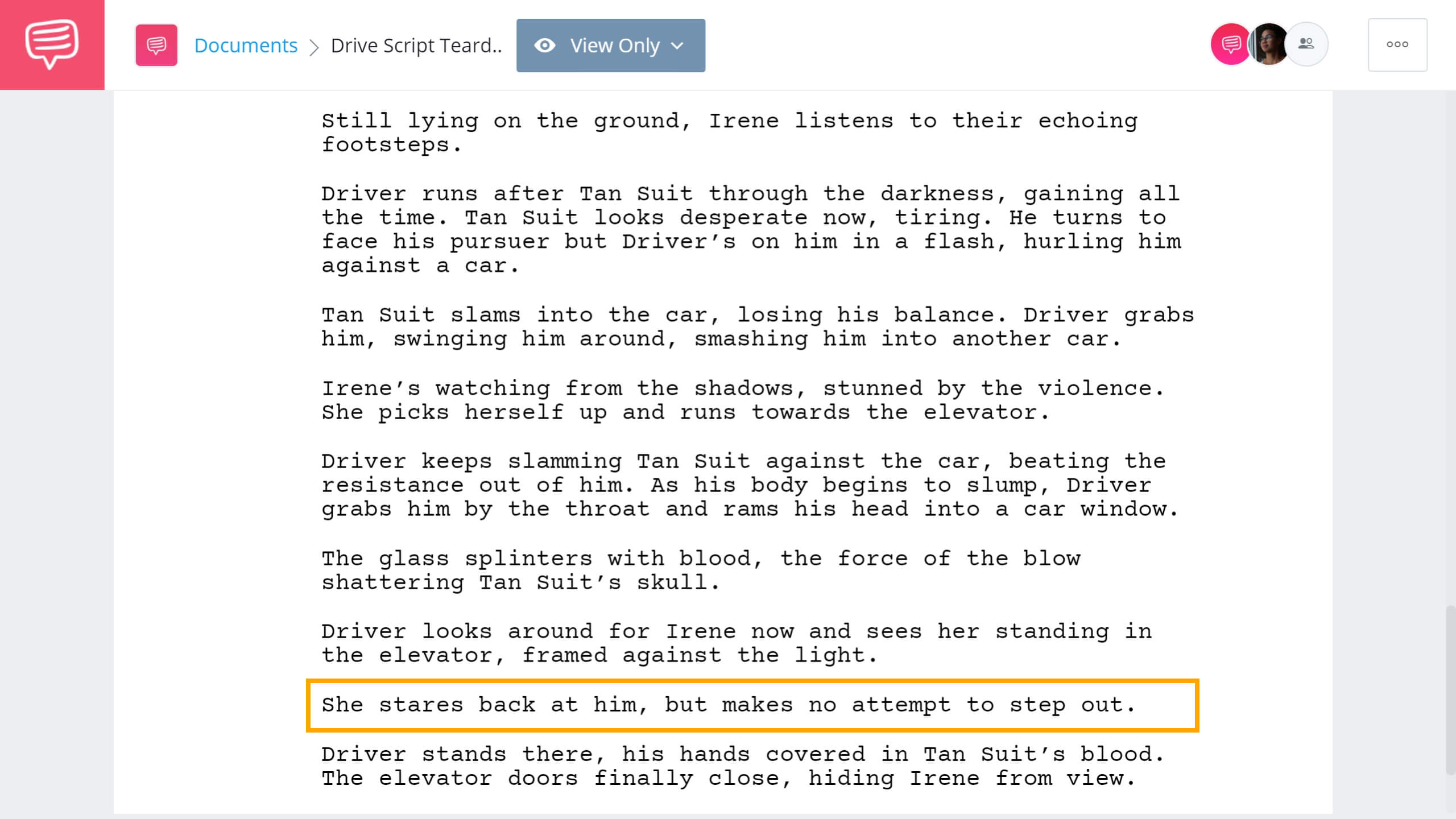Perhaps Drive’s most lasting impact is its look. The exquisite framing, blocking, and lighting throughout the film immerse the audience in a nocturnal cityscape that’s as dangerous as it is hypnotic.
But the ethereal tone of Drive doesn’t just come from director Nicolas Winding Refn. The Drive script is a masterclass in restraint, allowing for a meditative feel to permeate the film. How does the Drive screenplay work? What does such a visual-oriented movie’s script look like?

WHO WROTE drive SCRIPT?
Written by Hossein Amini
Hossein Amini is a British screenwriter and film director. He has written numerous screenplays, including The Wings of the Dove, Killshot, Drive, Snow White and the Huntsman, and 47 Ronin. With The Wings of the Dove, he was nominated for an Academy Award for Adapted Screenplay.
Drive is based on a novel by James Sallis.STORY BREAKDOWN
STRUCTURE OF DRIVE SCREENPLAY
Here is the story structure for the Drive screenplay:
Exposition
Driver goes on a mission: we see how he works. It’s impersonal, professional, and successful.
Inciting Incident
Driver locks eyes with Irene in their apartment’s elevator. Both are clearly interested in each other.
Plot Point One
Driver’s down-on-his-luck friend, Shannon, introduces him to Bernie Rose, a menacing figure who is going to fund Driver’s stock car career.
Rising Action
Irene’s husband, Standard, is released from prison and is underwater with debts owed to bad people. Driver, committed to keeping Irene and her son safe, agrees to help Standard with one last job.
Midpoint
Standard's job goes horribly wrong: Standard is killed and Driver is now stuck with bad people’s money.
Plot Point Two
Driver is in survival mode and (kind of) fills Irene in. She watches as he stomps a dude’s head in. He realizes that the goons know who he is.
Build Up
Driver is on a warpath. He kills Nino.
Climax
Driver and Bernie finally meet under the auspices of Driver returning the money. The two stab each other.
Finale
Irene knocks on Driver’s door. He’s not there; he’s driving off into the sunset.
Drive movie script pdf
Drive as a Love Story
On its surface, Drive has all the trappings of the best Neo-Noir movies. But stripped from its stylistic flourishes, it is a love story at its core. Every decision Driver makes is rooted in his love for Irene, and it’s that love which really propels the story.
Before Driver meets Irene, he seems aimless, going through the motions. After their introduction, his decisions, and therefore his character arc, are more purposeful and meaningful.
And so it’s crucial that Driver and Irene’s relationship works. If there’s no chemistry there, the entire story falls flat: “Wait, he’s helping her husband rob a pawn shop because…?”
Amini’s script does a masterful job at building Driver and Irene’s connection, so that by the end we don’t question why Driver is risking his life away for her. Amini does this with minimal dialogue and space (the entire screenplay is only 89 pages).
Let’s take a look at one particularly effective scene, which we imported into StudioBinder’s screenwriting software:
Drive 2011 Film Script • Read Romance Scene
It’s a beautifully-written moment, and it’s thanks to Amini’s careful attention to the scene directions. Take, for example, the following paragraph:
“Inside, the silence is unbearable. Irene pauses, then looks at Driver. He’s even more handsome in the shadowy half-light, something achingly lonely and melancholy about his stillness.”
This is novelistic writing, but it works because so much of Driver and Irene’s relationship is told through looks and quiet moments. Amini is emphasizing this importance to the director by spending the time describing it in painstaking detail.
It should be noted, too, that this is a huge piece of information that Irene’s dropped, one which could effectively end their romance. Driver’s verbal response is surface-level – what’s crucial is his physical performance, not what he’s saying.
A lesser script would probably have something like this:
“That was my husband’s lawyer on the phone. He’s getting an early release…”
“Husband?”
“He’s been in prison.”
“I… didn’t know.”
“I’m sorry.”
This dialogue is fine, but Amini gets it across more efficiently, and more devastatingly, with just three lines.
But the restraint doesn’t stop there. Director Nicolas Winding Refn cuts down the dialogue even more. Take a look:
Driver and Irene
Here, we have Irene’s line and nothing else – just the mournful look of Driver. That’s not the only change; the romantic hand holding moment happens before this, cross cut with Irene getting ready for work.
This editing room decision wouldn’t have been possible without a script that details these visual cues.
Drive Script Takeaway #2
Drive’s perfect villain
The scene-stealer of Drive is Albert Brooks. His Bernie Rose character is menacing without being cartoonish. He doesn’t scowl, he smiles. He doesn’t threaten, he suggests.
And while much of Bernie Rose’s memorability comes from Brooks, the Drive script also should be credited for his effectiveness.
His antagonist introduction is pitch-perfect, sitting in a pizzeria getting served Chinese food and scaring the crap out of a waiter.
But his introduction to Driver is even better. Take a look at the scene:
Drive Movie Script PDF • Read Bernie Rose Introduction Scene
The obvious stand-out here is the one-two punch of Bernie and Driver’s exchange. It’s memorable, clever, and informative. When a script has so little dialogue, each line carries extra weight. Amini knows this and delivers.
But, once more, the most important plot movement is in the scene direction. Amini is telling the story through looks – both characters are sizing each other up, and they understand each other.
This all comes across in the adept performances of Brooks and Gosling.
Driver and Bernie meet
Even behind sunglasses, we know what these characters are doing.
Ironically, because the dialogue is so sparse in the Drive script, there are a multitude of memorable lines. Here are just a few more:
“There's a hundred-thousand streets in this city. You don't need to know the route. You give me a time and a place, I give you a five minute window. Anything happens in that five minutes and I'm yours. No matter what. Anything happens a minute either side of that and you're on your own. Do you understand?”
“You know the story about the scorpion and the frog? Your friend Nino didn't make it across the river.”
“How 'bout this. You shut your mouth or I'll kick your teeth down your throat and I'll shut it for you.”
“A lot of guys mess around with married women, but you're the only one I know who robs a joint just to pay back the husband. Crazy.”
Drive Script Takeaway #3
The Drive ending
Drive’s ending is so successful because of the patience Amini exhibits for the first two-thirds of the script.
For most of the film, Driver is quiet and subdued, doing what he’s told without any fuss. This all changes when his lover’s husband is shot in front of him (who among us hasn’t experienced this?).
What’s key to the extreme violence that follows, why we’re still rooting for Driver, is that his hand is forced. He’s backed into a corner and has no other option but to fight his way out. As an audience, we can’t help but support him. What else are we supposed to do?
Smartly, however, Amini emphasizes that the violence Driver commits is not without its consequences. This isn’t just some badass revenge flick. Amini uses the final act of Drive to further a powerful theme, and one that is all too rare in action films: violence begets violence, nothing more.
This theme is most clearly illustrated in the iconic elevator scene, which in the script takes place in the garage:
Drive Script PDF • Read the Elevator Scene
Despite the change in location and the difference in fight choreography, the critical ending of the scene remains the same. In the world of Drive, retributive violence doesn’t get the girl.
Instead, it alienates her.
It’s a heartbreaking scene because the audience understands where both characters are coming from: Driver wants to protect Irene, and Irene wants nothing to do with violent criminals. It’s a conflict which has no resolution.
Both actors play this realization perfectly, informed by Amini’s script, which indicates both characters know in this moment that their love is doomed:
Drive elevator scene
All of this pathos, narrative, and theme packed into one scene which is completely devoid of dialogue. It’s a filmmaker’s dream.
Related Posts
UP NEXT
Read and download more scripts
Drive encapsulates the power of stripping your script down to just its most necessary components. If you want to continue reading screenplays, we have similar titles like Blade Runner 2049, The Silence of the Lambs, and Tenet in our screenplay database. Browse and download PDFs for all of our scripts as you read, write and practice your craft to become the next great screenwriter.
